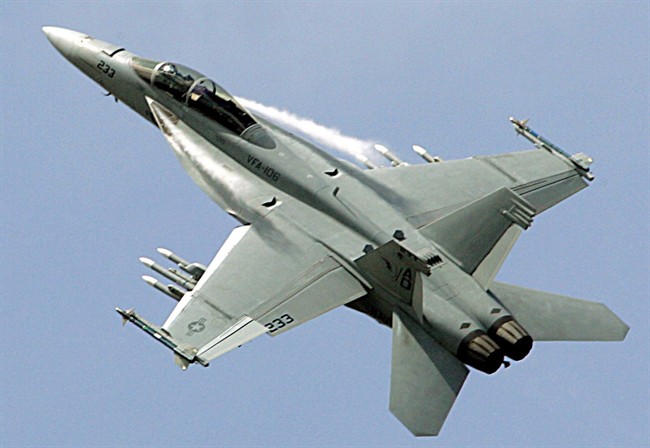Boeing still really wants to be friends with the Canadian government but it is not backing down on its trade challenge against Bombardier even if that means watching the government buy jets from someone else.

In a press release Friday morning, the St. Louis-based firm says there are still plenty of ways for the company and Canada to work together even if the government is now considering buying used jets from the Australian government.
READ MORE: Canada scraps Boeing fighter jet deal, will buy used Australian F-18s instead
Until last spring, Boeing was set to provide the federal government with 18 Super Hornet fighter jets in an interim procurement deal to stave off a competition to replace the full fleet of the Royal Canadian Air Force.
That deal evaporated over the summer as Boeing doubled down on a trade challenge against Bombardier.
“Although we will not have the opportunity to grow our supply base, industrial partnerships and jobs in Canada the way we would if Canada purchased new Super Hornets, we will continue to look to find productive ways to work together in the future,” the company wrote.
WATCH BELOW: What is going on with the Bombardier, Boeing dispute?

The statement also hinted at the company’s continued plan to pursue the trade challenge against Bombardier which kicked off a nasty bout of verbal tit-for-tat over the summer between Canadian officials and company head honchos.
Boeing filed a complaint with the U.S. Commerce Department earlier this year alleging that Bombardier receives illegal subsidies from the Canadian government and that it used those subsidies to sell its C Series aircraft below cost to Delta Airlines in 2016.

Get daily National news
READ MORE: Bombardier got subsidies? Boeing received $64B from the U.S. government
The U.S. Commerce Department proposed a 300 per cent tariff on the jets Bombardier had sold to Delta, but those will not take effect unless approved next year by the U.S. International Trade Commission.
- 3 in 10 Albertans would vote for independence — but only half committed to separating: poll
- Much of Canada faces extreme cold, heavy snow in latest winter blast
- Pimicikamak Cree Nation to evacuate 79 more homes after military assessment
- China’s envoy says Beijing, Ottawa ‘eye to eye’ on supporting Greenland
Prime Minister Justin Trudeau said in September that Canada will not buy jets from Boeing unless it drops its challenge of Bombardier.
“We won’t do business with a company that is busy trying to sue us and put our aerospace workers out of business,” Trudeau said during a press conference in with British Prime Minister Theresa May.
READ MORE: Boeing launches PR campaign touting economic contribution to Canada
Boeing said Friday it remains committed to the issues it has said it launched the complaint to address: namely, to check the rise of what it bills as a potential subsidized rival.
Officials at Boeing have said they did not take seriously enough the rise of Airbus, the European aerospace firm that rose up in the 1990s to become Boeing’s arch-rival.
“Our commitment to creating a level playing field in aerospace remains,” the statement reads. “Therefore, we will continue to support all efforts to build an environment of free and fair competition marked by compliance with agreed-upon rules.”
The Canadian government is expected to announce the formal launch of a competition to replace the full fleet of aging CF-18 Hornets used by the Royal Canadian Air Force, and at the same time announce its plan to buy used fighter jets from Australia.
It is not yet certain whether Boeing will bid on the full fleet replacement.
A source told Global News the company will look at the requirements listed by the government and make a decision then.








Comments